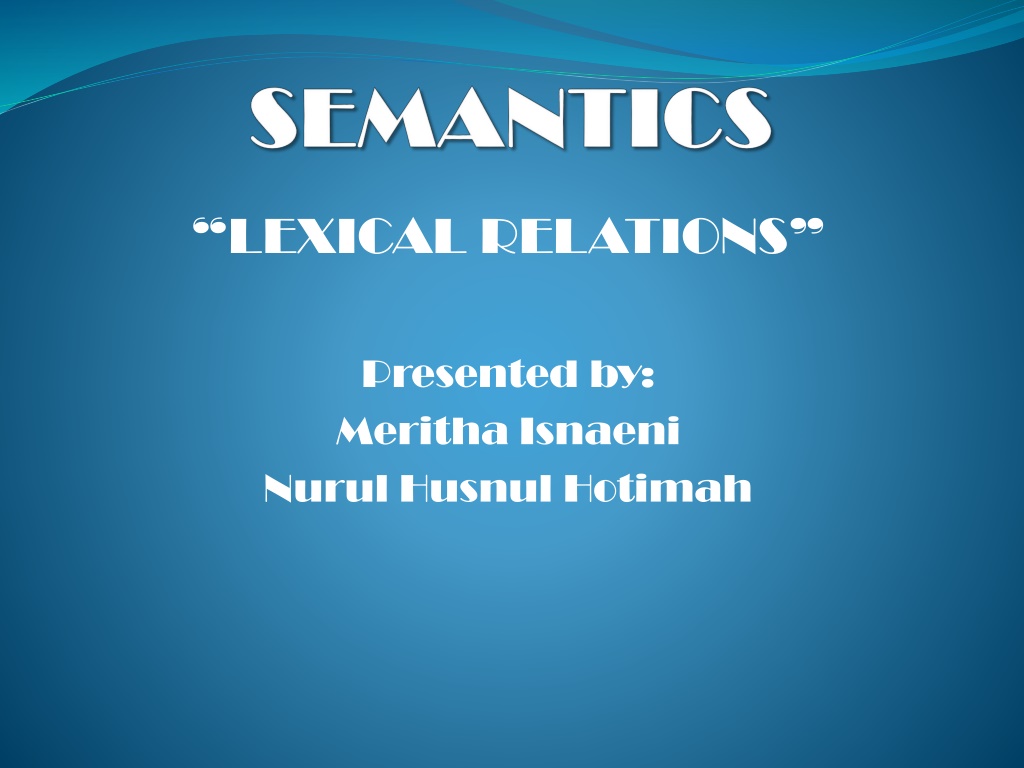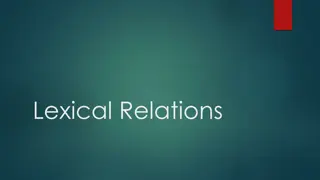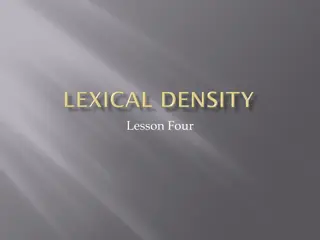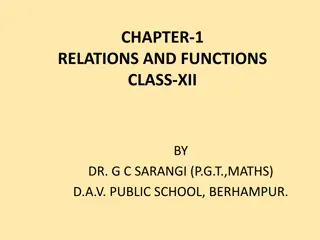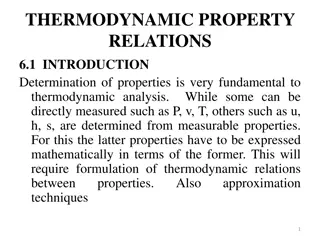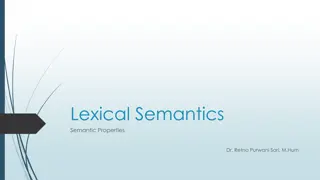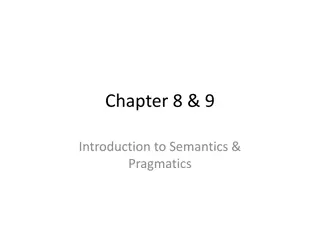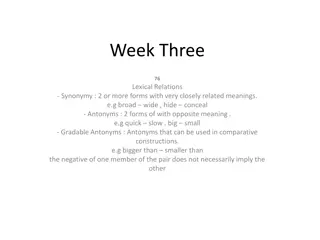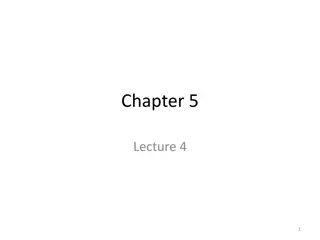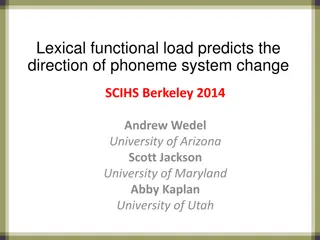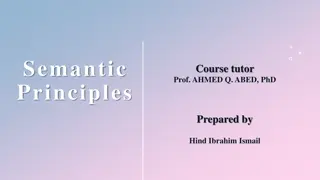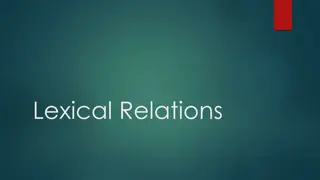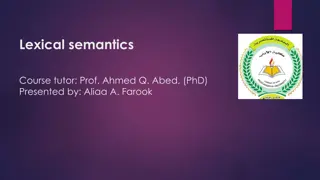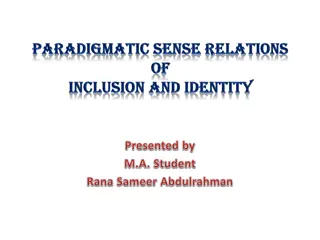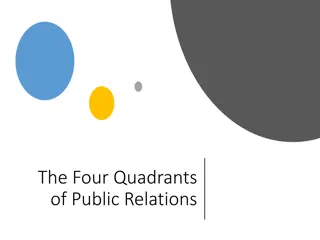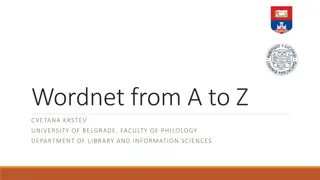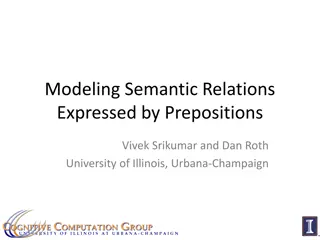Understanding Lexical Relations in Language
Lexical relations play a crucial role in understanding the meanings of words in any language. They encompass relationships like entailment, paraphrase, and contradiction, shedding light on how lexemes are interconnected. Additionally, lexical fields and kinship systems offer further insights into how words are categorized and relate to each other based on shared features. Explore hyponymy relationships that showcase the hierarchical structure within semantic categories, deepening your understanding of lexical connections.
Download Presentation

Please find below an Image/Link to download the presentation.
The content on the website is provided AS IS for your information and personal use only. It may not be sold, licensed, or shared on other websites without obtaining consent from the author. Download presentation by click this link. If you encounter any issues during the download, it is possible that the publisher has removed the file from their server.
E N D
Presentation Transcript
LEXICAL RELATIONS Presented by: Meritha Isnaeni Nurul Husnul Hotimah
LEXICAL RELATIONS One of knowing the meanings of lexemes in any language is the recognition that two ore more lexemes may have some semantic relationship, like father and mother; employer and employee; big and large; blue, red, and yellow. Two approaches to the description of lexical relations, semantic field theory and truth conditional semantics. Field theory is an attempt to classify lexemes according to shared and differentiating features. Meanwhile, Truth conditional semantics studies lexical relations by comparing predications that can be made about the same referring expression. Its task is to account for the meaning relations between different expressions in a language.
Three such relations, like: Entailment is the relation between two propositions let s label them p and q such that if p is true, q must also be true, but if q is true, it does not necessarily follow that p is true. Paraphrase is the relation between two propositions, p and q, such that if either is true, the other is necessarily true also, and if either is false, the other is false. Contradiction is the relation between two propositions such that if either is true, the other is necessarily false.
Lexical Fields To some extent we can define a lexeme by telling what set it belongs to and how it differs from other members of the same set. Ex: sports (tennis, badminton, golf, soccer, basketball ) creative writings (poem, novel, short story, biography, essay ) manual occupations (electrician, plumber, welder, carpenter, painter ) colors (red, blue, black, green, yellow )
Kinship Kinship is universal since all humans are related to other humans through blood ties and through marriage, but kinship systems differ from society to society. A relationship is a kind of predicate. Sentences such as Harold is Alice s father and Rose is Jerry s sister have a propositional content that we represent this way: Theme Predicate Associate Harold father-of Alice Rose sister-of Jerry Some of the predicate relations in all kinship systems can be described with four primitive features: [parent], [offspring], [sibling] and [spouse].
Hyponymy a. Rover is a chollie. 1. b. Rover is a dog. Here we see a kind of relation that is an example of entailment. The relationship between two sentences [a] and [b] that differ only in that [a] contains a hyponym and [b] contains a superordinates can be summarized this way: a b & ~a ? b ? & ~b ~a If we join two of these sentences with and, c. Rover is a collie and (Rover is) a dog
Synonymy Synonymy refers to words that are pronounced and spelled differently butcontain the same meaning. For example: The bus left promptly at 10. The bus departed promptly at 10. Thus for any two sentences [a] and [b] that differ only in the presence of synonymous terms we can express their truth relationship this way: a b & b a ~a ~b & ~b ~a
Practice Romance, seems to have numerous pairs and even trios of synonyms. Ten such pairs of nouns are given below. For each pair try to decide what difference the two words have a context in which one is possible but the other is not, or a difference in the effect created where they share a context. You may also want to say which is of Old English origin and which came from French. ache, pain altitude, height center, middle cord, string dale, valley In the phrase a funny story we can replace funny with the synonymous adjective humorous. In a funny feeling a better synonym for funny is peculiar, but humorous and peculiar are not synonymous with each other. Each predicate below is illustrated in several contexts. Give a synonym for each context and test to see whether a single term can be synonymous in more than one of the contexts. a clear sky, a clear stream, a clear speech a wild party, wild geese, wild rice English, because of its double-barreled vocabulary, Germanic and error, mistake force, strength labor, work pace, step sight, vision
Antonymy predicates which are mutually contradictory. Two sentences that have the same subject and have Example: a. The television is on now. The television is off now. b. The road is wide here. The road is narrow here.
Thanks for attention
